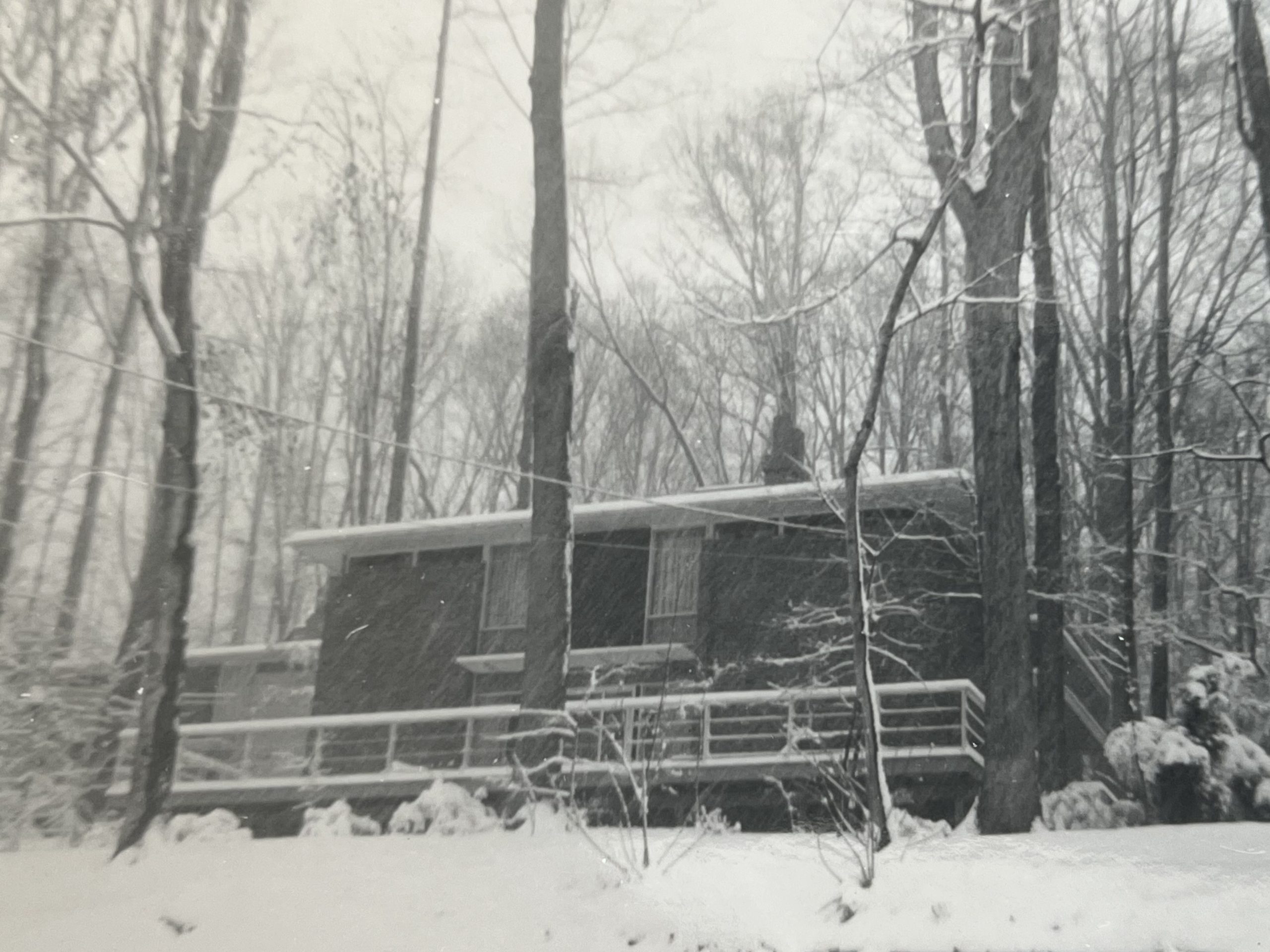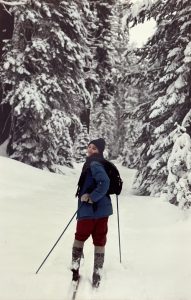
It really does snow in Bethesda
As a child in Michigan, snow was just a fact of life. But when living in coastal California as an adult, snow almost never fell. Snow became a destination. Fortunately, the westerlies that dumped winter rain on the Bay Area turned into snow over the Sierra Nevada, sometimes with legendary results: there was a 22 foot snow pack the year the Donner Party was stranded, memorialized in the height of the base of the statue next to Donner Lake.
I developed an awe of the men (I never saw a woman) who worked for CalTrans at all hours and conditions, keeping the roads open.
There was a time when we made regular trips across the Central Valley and into the mountains just to spend days in the snow. While we cheered at heavy snow reports, there was always the risk of the dreaded chain-up stations and inspections as the elevation increased–if you couldn’t avoid them by having a four-wheel drive vehicle with proper tires. Not a fun time to be a trucker with an 18-wheeler. Sometimes the highways would shut down completely until they could be cleared, and I developed an awe of the men (I never saw a woman) who worked for CalTrans in all hours and conditions, keeping the roads miraculously open against the odds. That was the first time I saw not snow plows, but snow drills on their trucks, biting into the drifts and tossing the snow up and over the embankments. Houses built near the pass had tunneled walkways to access the front doors. The impressive snow high up contrasted with the view from some of the peaks down to the brown and dry Nevada plains on the lee eastern side. By February, the trip home to the coast could bring us from white snow back through the Central Valley with its fields now green and colored with daffodils and flowering plum trees.
I suppose I shouldn’t really have been surprised to find that places with milder climates don’t deal with the odd snowfall very well. This first became clear when my family moved to suburban Maryland near Washington DC when I was in high school and I experienced official “snow days”: schools closed and the sprawling car-dependent metropolitan area decompensated for less than an inch of snow. Incredulous at first, it made more sense when I realized that there were few snowplows, people didn’t have adequate tires and, in any case, didn’t know how to drive in the snow.
Of course, the kids and maybe the teachers, loved the day off from school, even as parents scrambled. My sister was friends with a teacher who moved from Bethesda to snowy Ontario and reasoned that at least one benefit of the move north was a predictably larger number of days where weather would create some breaks. When she was chatting to a new colleague, she asked how many snow days they usually got. The slightly puzzled response was, “What’s a snow day?”




Which raises an unanswered question for me: would I eat other people to survive – I honestly do not know and hopefully I will never find out.
I hadn’t taken the question quite as far as you did, but I would have to answer the same—I don’t know and hope I never find out.
Khati, your story reminded me of the year I lived upstate and wrote about in
https://www.myretrospect.com/stories/my-snowy-year-in-Buffalo/
I had been teaching in New York City where the schools would close when severe snowy weather was predicted , and I assumed the same would be true upstate where the snow is legendary.
But I was soon disabused – in Buffalo when it snows the plows hit the streets and life goes on!
You understand! Buffalo is famous for huge snowfalls and Lake effect—and it sounds like they are ready for it too.
Yep, Buffalo is ready and used to it, and it’s business as usual despite the weather!
I made good friends there, learned to ski, had my wonderful first job there, and enjoyed the Albright Knox art gallery. Unfortunately the marriage didn’t work out!
At least there was a silver/snowy lining!
I like your final line especially–it really brings the story to a fun conclusion. And harks back to the title.
A little bit of a rumination about days of snow and varied responses, but glad you liked the circle back. That question still makes me smile too.
Khati: you describe my winters in California so well. I learned to ski without poles!
Since I am a historian and not a weatherman, I want to add a note on the Donner Party. There is a great deal of discussion about the cannibal “incident.” Here is one example:
Until now the Native American perspective has been left out of the telling of the Donner tragedy, not because the wel mel ti did not remember the pioneers, but because they were never asked, or perhaps were not ready to share. Their oral tradition recalls the starving strangers who camped in an area that was unsuitable for that time of year. Taking pity on the pioneers, the northern Washoe attempted to feed them, leaving rabbit meat and wild potatoes near the camps. Another account states that they tried to bring the Donner Party a deer carcass, but were shot at as they approached. Later, some wel mel ti observed the migrants eating human remains. Fearing for their lives, the area’s native inhabitants continued to watch the strangers but avoided further contact. These stories, and the archaeological evidence that appears to support them, certainly complicated my interpretation of the Donner Party event. The migrants at Alder Creek were not surviving in the mountains alone—the northern Washoe were there, and they had tried to help.
(There is an allegory for today which I will spare you)
Thanks for that extra info Richard—really interesting. Reminds me of the great search for the Franklin Party which had disappeared while looking for the NW Passage. Turns out the Inuit had lots of info but weren’t asked or listened to. I read a book once that described the multiple attempts to resupply the Donner party and individuals who traversed the pass at various times throughout the winter—not as simple a story as you might imagine. Evidence of cannibalism was hardly ubiquitous. I don’t remember details about the indigenous people’s attempts to help and how they were rebuffed—allegories abound as you say.
So true how people’s perception of snow and how to deal with it varies, depending on how much snow they are used to getting and the resources they have to deal with it. Also, I don’t remember weather forecasts being used to guide responses to snow when I was a kid, or even when my kids were young. Perhaps we rely on them too much now as they are not always that accurate.
The blessings and curses of improved weather forecasting! I find it still helps to look out the window. You are probably right that, especially in areas ill-prepared for snow, there is some over-reaction when the possibility of snow arises. Overall we have amazingly improved forecasting tools however, and have never needed them more to be prepared in our climate-disordered world.